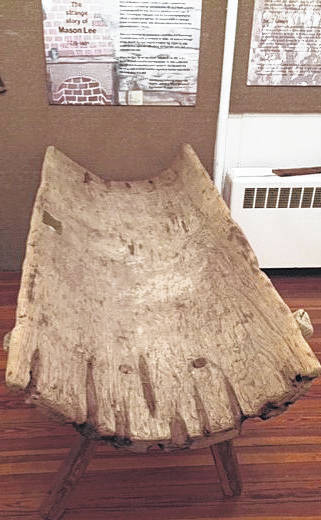Mason Lee: One of the county’s
‘most colorful residents’
BENNETTSVILLE, South Carolina — More than 200 years ago, a bolt of lightning struck Mason Lee and forever changed his life.
“One of Marlboro County’s most colorful residents … he was born in 1770 in North Carolina,” said Lynn McQueen. “Lee lived an unremarkable life as an accountant until the age of 30, when he was struck by lightning.
“He survived the blast, but was never the same again,” she added. “Shortly after, he relocated to Georgia, where he killed a slave.”
After the accident, Lee became a man with various oddities. He believed that all women were witches and that demons were out to get him and he based his life around the belief that ghosts, witches and demons were the cause of his woes and misfortunes.
According to an article published in 1949 in the Charleston Post and Courier, written by Lulu Crosland Ricaud, “He left his home, family and friends and went to Georgia. When he recovered from the shock and severe burns, his entire nature had undergone a complete change.”
But there is nothing to substantiate the presence of witchcraft or the supernatural in Marlboro County.
“I have seen no records to indicate that witchcraft was ever prevalent in this area, Marlboro County, during this time,” said McQueen. “This concept seems to be unique to Mason Lee.”
Lee’s extreme relocation was the least of his transition into his new normal — which took a tragic turn.
The Post and Courier article stated: “There (in Georgia) he killed a man in a fit of temper and fled to Brownsville Township, Marlborough District.”
Marlborough District is the olden day name of Marlboro County.
According to a dissertation published by Stanley South of the University of South Carolina, the man Lee murdered was one of his own slaves and sent him on the run.
“Fearing prosecution,” said McQueen, “he ultimately settled in the Brownsville area of Marlboro County. Within 12 years, he had increased his land holdings from 50 to nearly 4,000 acres.”
After the lightning strike, Lee was continually seen as eccentric and paranoid.
“Though he was a prosperous farmer,” said McQueen, “He lived in conditions worse than his slaves. His house had no doors or windows, and he entered and exited through a trap door in the roof.”
Lee was also known to sleep in a hollowed-out gum log and made his own crude clothes. The legendary log used as his bed can be found on display at the Marlboro County Museum in Bennettsville.
He believed that he could not sleep on a bed made by any woman.
In Ricaud’s 1949 article, it is stated that: “His clothes were of his own make, they had no buttons, his pantaloons were as wide as a woman’s petticoat without any waistband and fastened around him with a rope.”
The article continued by saying, “His cloak was a blanket with a hole cut through it to receive his head.”
Lee was also reportedly extremely dirty and would go months without washing his clothes.
According to South’s paper, “He believed he had conversed with God; and said he had met Him in the woods, and promised Him that if he would let him get rich, he would live poor and miserable all his life.”
Ricaud’s article added: “He kept his head shaved so the witches might not get hold of his hair.
“In the daytime, Lee dozed in his hollow gum log,” the article continued. “It was his only bed and at night he kept awake beating and striking around the room, thus keeping the evil spirits away.”
It has also been said that, at one point, Lee believed that he had the devil nailed inside one of his fireplaces at one end of his house.
“He had a mark made across his room, over which he would never pass, or suffer it to be swept,” said South in his dissertation.
It was said that sometimes he also would have his slaves throw dirt on the roof of his house to drive away witches.
“He also made wooden swords with which to fight the demons,” said McQueen.
According to South he had innumerable swords of various shapes and sizes, making anywhere from 12 to 20 a year. Lee also drilled holes into his hats and cut off the tops of his shoes to dispel the devil if he were to get inside.
Along with his eccentric behaviors, Lee believed that his family was out to get him and had the aid of supernatural beings.
Lee believed that the reason behind the paranormal attacks was because ultimately his family, particularly Baker Wiggins, wanted to take his land, money and slaves.
“Lee was determined that the Wiggins and other relatives should have no part of his estate,” said Ricaud in the article.
South’s dissertation stated that Lee believed that the Wiggins family were in his teeth and dislodged them, he had 14 sound teeth extracted.
“He lived in fear that Baker Wiggins was trying to kidnap him and take him back to Georgia,” said genealogist Judy G. Russell in her article.
Lee also treated his own sons strangely.
“He had twin sons,” said McQueen. “But claimed only one.”
Lee supposedly believed that he had only fathered one of the twins.
Lee continued on with his paranoid and eccentric lifestyle until he died in 1821. Of course, Lee’s death was not the end to his story.
“When Lee died, he left his estate, valued at $50,000, to the states of South Carolina and Tennessee,” said McQueen.
To put things into perspective, $50,000 in the 1800s is equivalent to around $1,017,436 today.
According to records, Lee stated the will should be carried out “while wood grows or water runs.”
Lee’s relatives contested the will, saying he was of unsound mind.
Some of the reasons his family felt that way included:
— Lee believed that people could influence his body and mind at a distance.
— That witches had placed spells on him.
— He could be be-spelled if he “made water on the ground,” so he carried a tin cup with him for this purpose.
— He had no tables or chairs in his home and would not eat from a plate or use utensils, instead he ate with sticks.
— He would not allow his bulls or boars to be castrated, instead he cut off the tails of all his hogs and cattle.
“In 1827, an Appellate Court upheld the will, and the “Heirs at law of Mason Lee vs Executor of Mason Lee” became the leading case in South Carolina regarding mental capacity in the execution of a will,” said McQueen.
The relatives did not give up, however, returning to court several times over the next nine years, all to no avail.
“So, just how crazy do you have to be, to be too crazy to make a valid will,” said Russell in her article. “That was the question a South Carolina jury had to contend with Mason Lee’s case.”
Eventually, though, things did change.
“On Dec. 18, 1829, an act of the South Carolina Legislature deeded the remainder of Lee’s estate back to his heirs,” said McQueen.
Lee was eternally laid to rest in Old Brownsville Cemetery in Marlboro County.
JJ Melton can be reached at jmelton@laurinburgexch.wpenginepowered.com.





